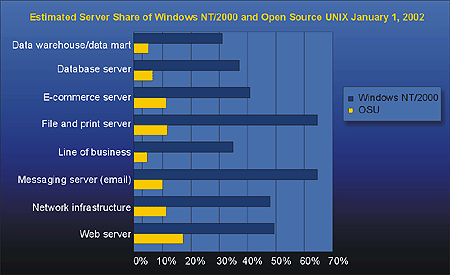Windows Will Dominate Enterprise Computing Despite Linux Challenge

Although open-source UNIX (OSU), especially Linux, will make astonishing gains over the next two years—between 100% and 700% gain in server share on eight major enterprise server applications—Microsoft Windows NT/2000 will maintain between a 30% and 65% server share on these same applications. This compares to a server share of around 10% or less for OSU on most of these applications. The study also shows that open-source UNIX will have the most impact among smaller companies, while Microsoft's server share continues to grow among the largest enterprises.

"The open-source UNIX movement is a true inflection point for the computing industry," said Peter Auditore, president of the BI/DW Research Program. "It does not, however, threaten Microsoft's dominance of the operating system market, at least for the next few years. Windows' huge installed base, the army of programmers developing for it, and the integration technologies that link this operating system and applications such as SQL Server and Microsoft Office are huge advantages that will require sustained attack for many years to overcome."
"Nonetheless," he adds, "open-source UNIX will make definite inroads into organizational and even enterprise-level computing over the next two years, and poses a serious threat to proprietary UNIX in particular."
A series of surveys are planned to develop a picture of the growth and development of this market. Data for this first survey in the series were gathered between November 15, 1999, and January 15, 2000, from respondents in North America with purchasing influence or authority. Eleven percent were corporate executives; nearly 75% were IT professionals, of whom almost 60% were executives or management; and almost 8% were line-of-business professionals.
Edited by John Spofford
